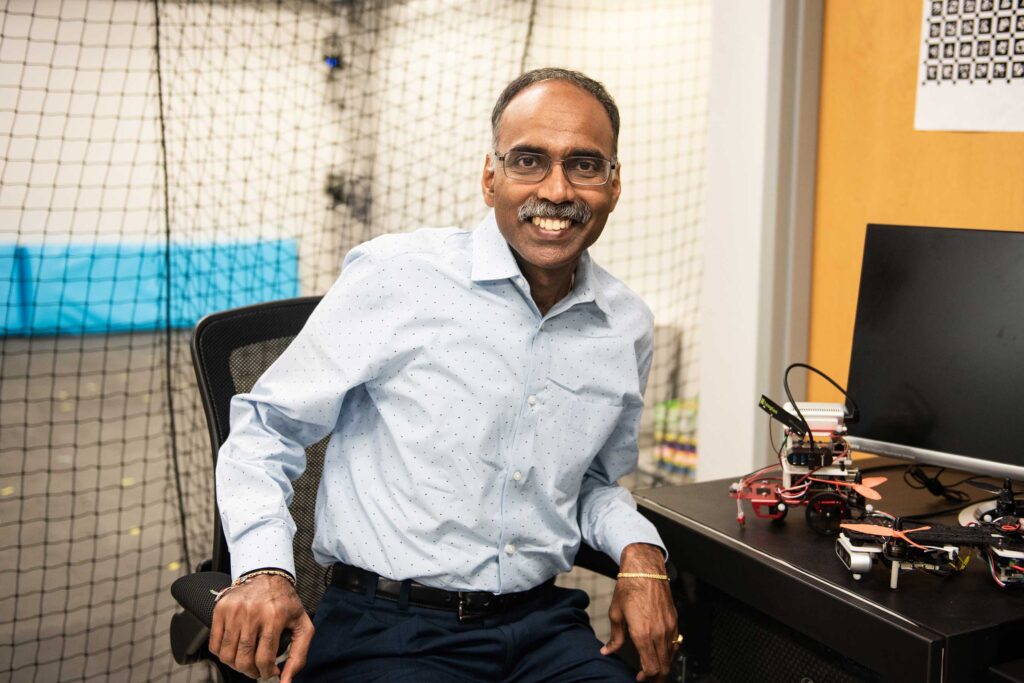
Maruthi Akella, a professor in the Cockrell School’s Department of Aerospace Engineering and Engineering Mechanics (ASE/EM), has been selected to receive the Dirk Brouwer Award by the American Astronautical Society (AAS). The award recognizes significant technical contributions to space flight mechanics and astrodynamics. It was established in 1972 as a flagship award given annually to honor Dirk Brouwer’s outstanding role in celestial mechanics and his widespread influence on workers in space flight and astrodynamics.
Akella was selected for “seminal contributions to learning and adaptive control for spaceflight applications.” He is one of five ASE/EM faculty members to win the AAS Dirk Brouwer award, including Byron Tapley, currently a research professor and the founder and former director of the Center of Space Research (CSR). Roger Broucke, Bob Schutz and Victor Szebehely also previously received the award.
“One of the major factors that drew me to UT Austin was because of our world-renowned orbits area faculty with distinguished members like Byron Tapley and the others who have received this award having made foundational contributions to the astrodynamics field,” Akella said. “These colleagues inspired and mentored me throughout my career and I am humbled to follow in their footsteps as a recipient of this significant honor.”
Tapley, an emeritus professor who also served as the ASE/EM Department chair from 1966 – 1977, said Akella is well-deserving of the award.
“I am especially pleased to see the recognition of Professor Akella’s extensive contributions to the development of guidance and control methodology,” Tapley said. “His record in the classroom and in the research lab and his service to professional societies epitomize the foundational contributions envisioned for the Brouwer award. He is an excellent addition to the distinguished community of previous recipients.”
Akella’s work in adaptive control and learning algorithms has many applications in space vehicle guidance and autonomy. His group’s work has resulted in significant efficiencies for spacecraft mission designs that allow for a considerably lower number of onboard sensors and require much less propellant.
“Payloads come at a premium. A large mass limits how much can be carried onboard a spacecraft,” Akella said. “Everything we can save matters.”
One example of onboard sensors is the gyro, which provides information about how the spacecraft is tumbling in space. Gyros can be costly, – in the hundreds of thousands of dollars –take up a lot of space, and oftentimes require special approvals with long lead times.
“We gave the first result proving that control of spacecraft rotational tracking motion is possible without using gyro feedback,” Akella said. “Saliently, these algorithms are closed-loop guidance based, they are non-iterative, and present the advantage of being amendable for most of the state-of-the-art real-time flight computers.”
Akella’s machine vision solutions use onboard learning and they were successfully flown onboard the NASA Seeker-1 mission with the goal of advancing technologies for future satellite on-orbit servicing, fractionation, and enabling refurbishment of expensive space assets. His team will continue to refine these algorithms for use on future spacecraft missions such as NASA Seeker-2 and Gateway in support of the Artemis program.
Akella is the founder of UT’s Center for Autonomous Air Mobility (CAAM) and directs the Controls Group for Distributed and Uncertain Systems (C-DUS Group). He has received several prestigious awards for his far-reaching theoretical contributions and practical advances in aircraft/spacecraft guidance, navigation and control including the IEEE Technical Excellence for Aerospace Control Award, the Judith A. Resnik Space Award from the IEEE Aerospace and Electronic Systems Society, and the AIAA Mechanics and Control of Flight Award. He holds the Ashley H. Priddy Centennial Professorship in Engineering.
In August of this year, Akella will be recognized at the AAS/AIAA Astrodynamics Specialist Conference in Big Sky, Mont. where he will also deliver a plenary lecture.
